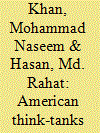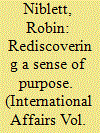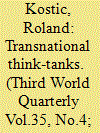|
|
|
Sort Order |
|
|
|
Items / Page
|
|
|
|
|
|
|
| Srl | Item |
| 1 |
ID:
073739


|
|
|
| 2 |
ID:
131419


|
|
|
|
|
| Publication |
2014.
|
| Summary/Abstract |
The rise of think-tanks in the United States, in Europe and around the world has generated considerable scholarly attention in recent years. Much of this interest has been fuelled by the widespread belief that these institutions have come to play an increasingly influential role in shaping both public opinion and the domestic and foreign policy preferences and choices of high-level decision-makers. This perception was reinforced when several think-tanks with close ties to the administrations of President George W. Bush and Prime Minister Tony Blair advocated a far more muscular posture towards Iraq in the months and years following the events of 9/1ya. As think-tanks on both sides of the Atlantic continue their efforts to become more entrenched in the policy-making process, scholars are beginning to pay closer attention to how these institutions, established ostensibly to engage in policy research, have become even more adept at political advocacy. Not surprisingly, as think-tanks have devoted more resources to affecting policy change, speculation about how much or little influence they wield has become more intense. The purpose of this article is to explore the evolution and transformation of foreign affairs think-tanks in North America and Europe since the late nineteenth and early twentieth centuries and to highlight, by relying on specific foreign and defence policy issues, the extent to which a handful of think-tanks have been able to become important fixtures in the policy-making community.
|
|
|
|
|
|
|
|
|
|
|
|
|
|
|
|
| 3 |
ID:
163267


|
|
|
|
|
| Summary/Abstract |
A series of centenary anniversaries for some of the original think-tanks, as well as increasing turbulence in domestic and international affairs, makes this a propitious time to review the role of think-tanks in helping to build a sustainably secure, prosperous and just world. Today, western think-tanks, in particular, face a number of challenges to their relevance and credibility. It remains to be seen whether they can rediscover a sense of purpose that is fit for the twenty-first century, at a time when the pillars of the western-led international order that mobilized their counterparts early in the twentieth century are eroding. To do so, I propose five practical steps that all think-tanks can take to adapt to these demands and challenges. I also suggest a set of principles that both western think-tanks and their counterparts in other parts of the world should commit to if they want to work together to promote the sort of peaceful and cooperative world that lies at the core of their stated missions. At heart, leading think-tanks must consider whether it suffices to try to remain sources of objective debate and analysis, or if it is time, once again, for them to adopt a more proactive stance, being explicit about the principles that they believe should underpin peace and prosperity. If independent think-tanks work together around converging principles, then they can contribute to the emergence for the first time of an inclusive international society and thus confirm their normative as well as practical value.
|
|
|
|
|
|
|
|
|
|
|
|
|
|
|
|
| 4 |
ID:
133259


|
|
|
|
|
| Publication |
2014.
|
| Summary/Abstract |
Peace-building situations can be described as battlefields of ideas where key international policy makers engage in internal battles for control over intervention policy. Knowledge production, based on timely information and analysis, is seen as crucial to winning these battles of ideas. By providing detailed information, analysis and recommendations, the International Crisis Group (icg) has assumed an important role in this process. Yet we know little about the specific role the icg plays in battles for intervention policy. This article investigates icg analyses and recommendations and the way they fit into the specific internal debates within the international community in Bosnia and Herzegovina (BiH) in 2000-01. By looking at the work of the icg in BiH around the elections in 2000, the article demonstrates that it often acted as a legitimising agent of US positions and policy in the country.
|
|
|
|
|
|
|
|
|
|
|
|
|
|
|
|
|
|
|
|
|